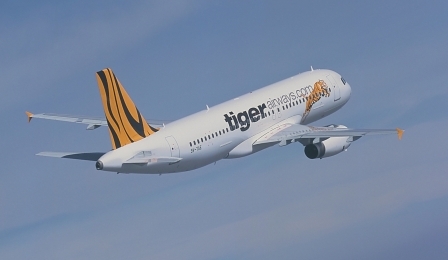
Tiger Airways to lose S$11.5m from Mandala profit mishap
Mandala likely to suffer $30-35m losses.
According to CIMB, it is currently forecasting Mandala to lose S$30m-35m for FY14 and FY15, which translates into associate losses of S$10m-11.5m for Tiger, based on its 32.5% stake in its associate, Mandala.
However, CIMB also noted that the operating environment in Indonesia is starting to become a little more benign for Mandala.
Here's more:
We believe that Mandala can benefit from the new bilateral air services agreement between Indonesia and Singapore, as well as Batavia’s exit from the Indonesian market. This could mean faster-than-expected breakeven, though more concrete developments need to materialise before we review our loss estimates.
The new bilateral air services agreement between Indonesia and Singapore will result in a 50% increase in capacity for four routes – Singapore to Bali, Jakarta, Surabaya and Medan.
Tiger and Mandala will be the key beneficiaries of this development, given that Tiger Airways is the only airline group to have Air Operator Certificates (AOC) in both countries.
Currently, Tiger Singapore is only operating two daily flights to Jakarta. According to CAPA, Tiger is planning to introduce six additional daily flights on the Singapore-Jakarta route, two for Tiger and four for Mandala. However, the process of distributing traffic rights and airport slots has yet to begin.
To secure traffic rights, Tiger Airways will need to clinch airport slots at Jakarta’s Soekarno-Hatta International Airport – these slots are a precious commodity at the highly congested airport.
Batavia’s exit from the Indonesian market could not have come at a better time. Batavia, a full-service carrier, was Indonesia’s fourth largest carrier. After a failed US$80m buyout by Malaysia’s AirAsia, Batavia crumbled under its US$468m debt obligation and ceased operations on 31 Jan 2013. All tickets purchased prior to the cessation of operations were either refunded or transferred to other airlines.
This opened up a window of opportunity for Mandala to cement its position in Indonesia. Mandala, Citilink and Travel Express offered to ferry Batavia’s passengers for free in exchange for Batavia’s slots at CGK.
Indonesia AirAsia was also keen to fill some of the void left by Batavia, but it was constricted by a lack of aircraft capacity Inheriting Batavia’s slots in CGK will not only improve Mandala’s near-term profitability but also help expedite the allocation of traffic rights as it is normal for regulators to request for proof of slot availability before allocating rights.
First of all, as a newly launched airline with off-peak slots, Mandala was facing difficulties in filling up its aircraft seats and as a result, the free ferry service did not come at a high incremental cost. In addition, Mandala recently increased its fleet size from 3 to 7 and Batavia’s much-needed slots will certainly help fill the new capacity.
























 Advertise
Advertise






